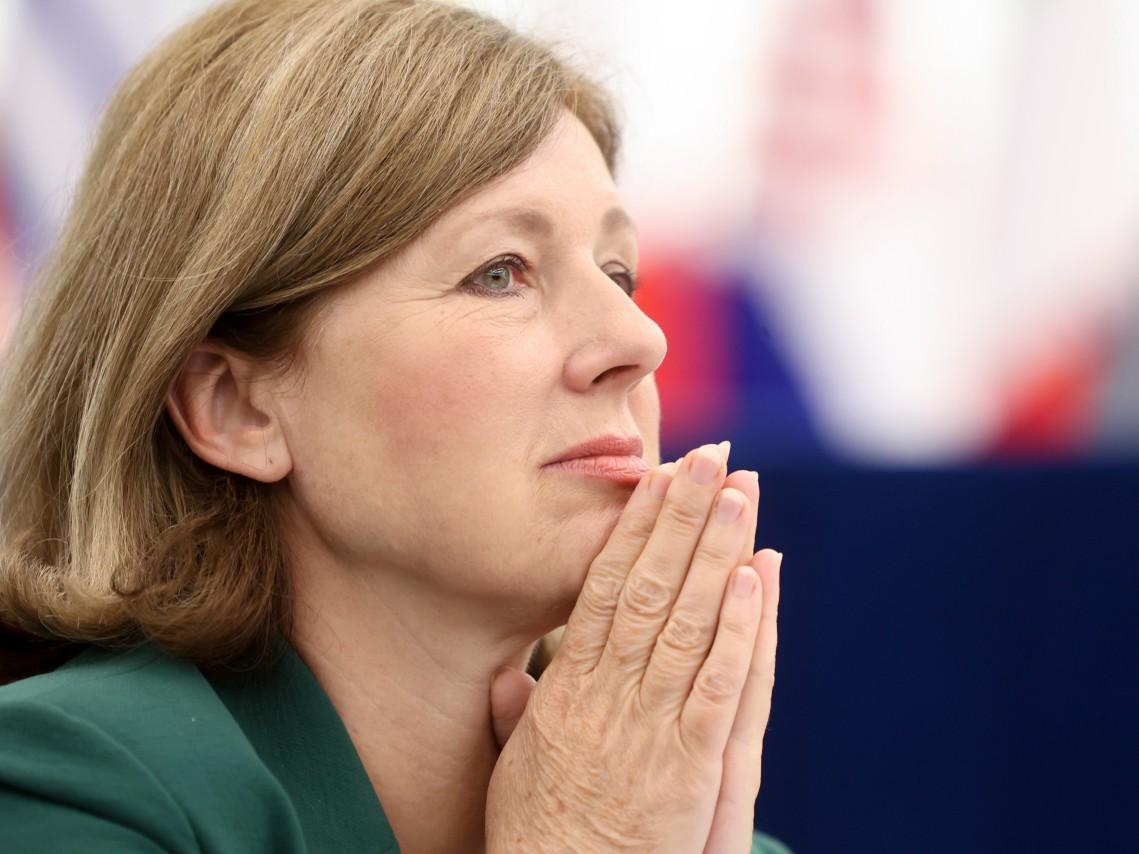'We cannot give a free ride for spying': the EU official out to protect European media

Věra Jourová, European Commissioner
Věra Jourová is on a mission to defend media independence. The EU Commissioner for values and transparency was raised under communist rule and knows first-hand what life is like without a free press. Investigate Europe sat down with the Czech politician to discuss her plans for the landmark EU Media Freedom Act and the growing threats facing journalists throughout Europe.
Mrs Jourová, until recently most EU experts and politicians believed regulation of media is not the EU’s business and only a national competence. What made you change your mind and propose an EU law to protect media freedom?
We were in a desperate situation. I had not any answer to those who asked me, what do you do about the media in Hungary? How will you protect KlubRadio [an independent station which lost its broadcasting licence from authorities] there? How would you protect TVN 24 in Poland [authorities had attempted to force a sale of the critical network]? What will you do with the Public Slovenian Press Agency, which was forced to organize crowd funding because the government stopped paying for it for political reasons? And after all my diplomatic answers, why I cannot do anything, I got upset. And I realized that we want from the media a lot in democracy. And we don't give them any additional protection compared to the shoemakers. So I said in the parliament, we will deliver a law to tackle this.
So you started sort of a legal coup?
No, only a necessary legislative initiative. Look at the visible autocratic tendencies. I lived in communism, that was uncontrolled power, unchallenged power, and gradually unchallengeable power. This must not happen in any of the EU’s member states. And here the role of the media is clear, because they are the ones to keep the politicians under control. And I hear more and more from them that they also are under blanket of self censorship, being bashed, being attacked by the politicians, directly. If we want the media to play their important role in democracy, we simply have to come with a kind of European safety net.
But there is no genuine legal basis for the EU institutions working on media freedom. So, you claimed this were also a matter of the single market. Critics call this a legal trick, by which the EU Commission is grabbing new competencies. Aren't they right?
No. I was myself satisfied that many lawyers, also from the Council, confirmed, that we are right placing the law on this legal basis.
But the law has to survive in the courtrooms. When media freedom is under threat, it's not a matter of functioning of the market but of political power and democratic control. So, could the chosen legal basis maybe backfire when the affected media workers want to defend their rights in the courts and then refer to the EU law and the judges might say that this has nothing to do with market?
According to the EU treaties, the media service providers are placed onto the single market. So we do have this possibility – and it is actually the only choice to come with a strong law. The mothers and fathers of the treaty did not have enough fantasy to imagine to what extent the basic values and the safeguards of democracy might be put at risk. That's the reason why I simply cannot find any other legal basis. Does it sound as a complaint? Yes. It is.
Critics say the proposed law is too weak and only a catalogue for how the governments should treat media without establishing the instruments to actually force the member states to guarantee media freedom. Does the law miss the necessary bite?
It's not weak. When the law will be put in force it will be a strong basis for possible court disputes, for which until now you have in many countries absolutely no chance.
You mean in case there is a journalist who comes under pressure from the governments via their editor or the state authorities to change or stop critical publications, can she or he then take the case to a national court and complain, this violates the European media freedom law?
Yes, exactly because of these possible cases, we insist that it must be a directly applicable regulation. So the journalist can rely on the proper wording of the law. The main purpose is to protect them against the interference into their work against some kind of harassment from the site of the owner or of the state. Therefore we have Article 4 and Article 6.2, which say that journalists must be able to work freely without unjustified interference into the editorial freedom. And of course, there is also the possible pressure of owners on editors. So once having this law, you journalists might be able to defend your rights much better. The thing is that every media house should take appropriate measures to prevent these situations.
If media workers take this seriously it could start a wave of lawsuits against governments and media owners who interfere in editorial independence.
The idea of the law is to have media workers free from political pressure. I don’t think this is too much to expect in democracy. If there is no pressure, there will be no grounds for lawsuits. Everyone can defend their right and bring alleged breaches before national courts. And it is for courts to decide.
In addition, in case some governments would decide to have a new law affecting media freedom and pluralism, the Media Freedom Act introduces an independent European Board, consisting of national media regulators, that will issue opinions. They may be an important element in any decision on whether a member state has infringed the act.
I need to stress that we do not want to establish bodies which have omnipotent power over the media. These might be abused easily. That's why we instead establish the network of the independent bodies, whose members send representatives to the new media board.
Among them will be representatives of authorities, who are not at all independent, like in Poland, Hungary or also Greece and Slovenia.
Of course, I am aware of the concerns about the independence of media regulators in some member states. This is why the law will make it mandatory to make them independent. The beauty of this arrangement is: because the people from all member states will discuss the same issues, those who will be weaker will have a tendency to grow. It always works that good practices, shared experience, in some cases, even solidarity and collective effort will make it. I believe that this European media board will have many added values. It will follow the cases where for instance contrary to the law journalists are under pressure or other measures which shrink the freedom of media. The opinions of the board will not be legally binding. But their informed professional comments on certain situations in some countries will be discussed on the European level. And do not forget the role of the commission. We are the guardian of the law. In case the states do not comply with the law, we can launch infringement procedures, which again might lead to the European Court of Justice to decide.
In Hungary or Poland, the freedom of the media has already been nearly abolished. Can it be, that for these countries the law comes too late?
I think that for the countries where the board states loss of media freedom, it will create a loss of international reputation, for which most governments are very sensitive. Maybe Hungary is a bit immune now. But even for them it will sooner or later have a political impact. The toughest bit of the law is the provision in Article 4 that the state must not interfere in editorial decisions. Because it might trigger immediate reaction from the Commission side, when a member state does not comply. Infringements which might lead to very serious financial penalties from the European Court of Justice.
In Italy, the CEO and the President of Rai, the public television network, are both nominated directly by the government. And the administrative board is nominated by parliamentarians from the same parties who rule the country. Several reporters have recently left after the change of government and now most political programmes promote Prime Minister Giorgia Meloni. Article 5 of the EMFA demands public service media providers “shall provide in an impartial manner a plurality of information and opinion to the audience.” Does this mean the current Italian system would become illegal?
I proposed the Media Freedom Act to address these issues and strengthen the independence of public service media. No public media should become a party propaganda machine. On the Italian system as such, the concerns are clear. But every case will have to be assessed against the final text of the Media Act. So, this is too early to do a legal analysis. In principle, if the current arrangement stems directly from the Italian law, it would mean that there is a conflict of laws. On the basis of the primacy of the EU law the commission will have the right to start an infringement procedure.
Does this mean every Italian parliamentarian can go to the responsible court and claim the Italian system according to the new European law is no longer legal and force the parliament to change it?
This is how it could work.
We were in a desperate situation. I had not any answer to those who asked me, what do you do about the media in Hungary? How will you protect KlubRadio [an independent station which lost its broadcasting licence from authorities] there? How would you protect TVN 24 in Poland [authorities had attempted to force a sale of the critical network]? What will you do with the Public Slovenian Press Agency, which was forced to organize crowd funding because the government stopped paying for it for political reasons? And after all my diplomatic answers, why I cannot do anything, I got upset. And I realized that we want from the media a lot in democracy. And we don't give them any additional protection compared to the shoemakers. So I said in the parliament, we will deliver a law to tackle this.
So you started sort of a legal coup?
No, only a necessary legislative initiative. Look at the visible autocratic tendencies. I lived in communism, that was uncontrolled power, unchallenged power, and gradually unchallengeable power. This must not happen in any of the EU’s member states. And here the role of the media is clear, because they are the ones to keep the politicians under control. And I hear more and more from them that they also are under blanket of self censorship, being bashed, being attacked by the politicians, directly. If we want the media to play their important role in democracy, we simply have to come with a kind of European safety net.
But there is no genuine legal basis for the EU institutions working on media freedom. So, you claimed this were also a matter of the single market. Critics call this a legal trick, by which the EU Commission is grabbing new competencies. Aren't they right?
No. I was myself satisfied that many lawyers, also from the Council, confirmed, that we are right placing the law on this legal basis.
But the law has to survive in the courtrooms. When media freedom is under threat, it's not a matter of functioning of the market but of political power and democratic control. So, could the chosen legal basis maybe backfire when the affected media workers want to defend their rights in the courts and then refer to the EU law and the judges might say that this has nothing to do with market?
According to the EU treaties, the media service providers are placed onto the single market. So we do have this possibility – and it is actually the only choice to come with a strong law. The mothers and fathers of the treaty did not have enough fantasy to imagine to what extent the basic values and the safeguards of democracy might be put at risk. That's the reason why I simply cannot find any other legal basis. Does it sound as a complaint? Yes. It is.
Critics say the proposed law is too weak and only a catalogue for how the governments should treat media without establishing the instruments to actually force the member states to guarantee media freedom. Does the law miss the necessary bite?
It's not weak. When the law will be put in force it will be a strong basis for possible court disputes, for which until now you have in many countries absolutely no chance.
You mean in case there is a journalist who comes under pressure from the governments via their editor or the state authorities to change or stop critical publications, can she or he then take the case to a national court and complain, this violates the European media freedom law?
Yes, exactly because of these possible cases, we insist that it must be a directly applicable regulation. So the journalist can rely on the proper wording of the law. The main purpose is to protect them against the interference into their work against some kind of harassment from the site of the owner or of the state. Therefore we have Article 4 and Article 6.2, which say that journalists must be able to work freely without unjustified interference into the editorial freedom. And of course, there is also the possible pressure of owners on editors. So once having this law, you journalists might be able to defend your rights much better. The thing is that every media house should take appropriate measures to prevent these situations.
If media workers take this seriously it could start a wave of lawsuits against governments and media owners who interfere in editorial independence.
The idea of the law is to have media workers free from political pressure. I don’t think this is too much to expect in democracy. If there is no pressure, there will be no grounds for lawsuits. Everyone can defend their right and bring alleged breaches before national courts. And it is for courts to decide.
In addition, in case some governments would decide to have a new law affecting media freedom and pluralism, the Media Freedom Act introduces an independent European Board, consisting of national media regulators, that will issue opinions. They may be an important element in any decision on whether a member state has infringed the act.
I need to stress that we do not want to establish bodies which have omnipotent power over the media. These might be abused easily. That's why we instead establish the network of the independent bodies, whose members send representatives to the new media board.
Among them will be representatives of authorities, who are not at all independent, like in Poland, Hungary or also Greece and Slovenia.
Of course, I am aware of the concerns about the independence of media regulators in some member states. This is why the law will make it mandatory to make them independent. The beauty of this arrangement is: because the people from all member states will discuss the same issues, those who will be weaker will have a tendency to grow. It always works that good practices, shared experience, in some cases, even solidarity and collective effort will make it. I believe that this European media board will have many added values. It will follow the cases where for instance contrary to the law journalists are under pressure or other measures which shrink the freedom of media. The opinions of the board will not be legally binding. But their informed professional comments on certain situations in some countries will be discussed on the European level. And do not forget the role of the commission. We are the guardian of the law. In case the states do not comply with the law, we can launch infringement procedures, which again might lead to the European Court of Justice to decide.
In Hungary or Poland, the freedom of the media has already been nearly abolished. Can it be, that for these countries the law comes too late?
I think that for the countries where the board states loss of media freedom, it will create a loss of international reputation, for which most governments are very sensitive. Maybe Hungary is a bit immune now. But even for them it will sooner or later have a political impact. The toughest bit of the law is the provision in Article 4 that the state must not interfere in editorial decisions. Because it might trigger immediate reaction from the Commission side, when a member state does not comply. Infringements which might lead to very serious financial penalties from the European Court of Justice.
In Italy, the CEO and the President of Rai, the public television network, are both nominated directly by the government. And the administrative board is nominated by parliamentarians from the same parties who rule the country. Several reporters have recently left after the change of government and now most political programmes promote Prime Minister Giorgia Meloni. Article 5 of the EMFA demands public service media providers “shall provide in an impartial manner a plurality of information and opinion to the audience.” Does this mean the current Italian system would become illegal?
I proposed the Media Freedom Act to address these issues and strengthen the independence of public service media. No public media should become a party propaganda machine. On the Italian system as such, the concerns are clear. But every case will have to be assessed against the final text of the Media Act. So, this is too early to do a legal analysis. In principle, if the current arrangement stems directly from the Italian law, it would mean that there is a conflict of laws. On the basis of the primacy of the EU law the commission will have the right to start an infringement procedure.
Does this mean every Italian parliamentarian can go to the responsible court and claim the Italian system according to the new European law is no longer legal and force the parliament to change it?
This is how it could work.

Journalists in several EU countries have faced growing pressures from authorities and media owners in recent years.Shutterstock
In France the billionaire Vincent Bolloré has amassed an ever growing media empire and his mangers force the editors and reporters of his media companies to support racist ideology and the extreme right. Does the EMFA offer an instrument to block this kind of power abuse over by a media owner?
First, the impact of media concentrations on media pluralism and editorial independence will have to be assessed by French authorities. Second, there will be the opinion by the European board. And we have the conjunction with Article 6, because a new owner should not be allowed to interfere like this.
Which again shows the shrinking media freedom is not a problem in Eastern Europe alone.
Oh yes, in the negotiations I heard rather arrogant opinions that we are delivering this law to correct the things in the Central and Eastern Europe and damage fantastically functioning systems in Western Europe. I sharply disagree. There are also problems in France, in Italy and only God knows what can happen in Germany if the AfD party gets into power.
In Germany it has recently been revealed that the CEO of Axel Springer pressured his leading tabloid to support the election campaign for the Liberal Party. Would this still be legal with the EMFA?
It would have to be checked case by case. But of course, as a principle, we don't want to see the rich people buy media to influence politics.
The main instrument could be the Article 6 about editorial independence. But both the Council and the leading rapporteur in the European Parliament want explicitly to weaken this and give media owners the right to define autonomously an editorial line. The European Centre for Media Freedom has warned this would turn the very purpose of the article into the opposite. Do you agree?
It's complex. We are not regulating the media themselves, rather, the environment for them. Article 6 about editorial independence is the only one which goes inside. It fixes the principle. But we are not here to micromanage how the newsrooms should be organised. And here comes my call on the journalists and civil liberties organisations. They should accelerate activities which lead to measures to protect editorial independence.
Greece is also an important case. The national news agency, which provides 90 per cent of all news content for the media is directly governed by the prime minister's office. A reporter told us she was not even allowed to quote judges from the High Court who were critical of a draft government law. Will Article 5, which demands that “public service media providers shall provide in an impartial manner a plurality of information and opinions” make this kind of direct control of a leading state-owned media illegal?
We are monitoring what's happening in Greece, and yes, Article 5 should be applied here. I will discuss with Greek authorities the situation of media again, because I have a promise from the prime minister that things will improve, even before the Media Freedom Act is adopted.
Article 4 in your draft protects media workers against any attempt by national authorities to intercept their communication or to force them to disclose their sources. But the council has decided to put this provision under a general exemption for reasons of “national security”. All experts for media freedom say that when the exemption becomes law, it would not strengthen media freedom but weaken it. Do you agree?
I will defend in the negotiations with the council and the parliament the original commission proposal. We have to avoid the trap of making a kind of blank cheque for national security, even though it is the sole responsibility of each member state. It must not work like that. We drafted the proposal in a very balanced way. We have a rich case law, according to which these intrusive techniques like spyware can be only used in very justified cases, to the extent which is only necessary and proportionate. We have now the position of the council and we will have a chance to discuss further. Any worsening of the situation than without the law must not happen. There is always space for improved formulation, but it cannot give a free ride for spying.
Is this the red line for the commission? Would you withdraw the law if it is crossed?
This is a strong position from the side of the commission. The Media Act is there to protect journalists. We have to enter the negotiations with goodwill to have a final solution. But the goodwill finishes where we might worsen the situation of the journalists.
First, the impact of media concentrations on media pluralism and editorial independence will have to be assessed by French authorities. Second, there will be the opinion by the European board. And we have the conjunction with Article 6, because a new owner should not be allowed to interfere like this.
Which again shows the shrinking media freedom is not a problem in Eastern Europe alone.
Oh yes, in the negotiations I heard rather arrogant opinions that we are delivering this law to correct the things in the Central and Eastern Europe and damage fantastically functioning systems in Western Europe. I sharply disagree. There are also problems in France, in Italy and only God knows what can happen in Germany if the AfD party gets into power.
In Germany it has recently been revealed that the CEO of Axel Springer pressured his leading tabloid to support the election campaign for the Liberal Party. Would this still be legal with the EMFA?
It would have to be checked case by case. But of course, as a principle, we don't want to see the rich people buy media to influence politics.
The main instrument could be the Article 6 about editorial independence. But both the Council and the leading rapporteur in the European Parliament want explicitly to weaken this and give media owners the right to define autonomously an editorial line. The European Centre for Media Freedom has warned this would turn the very purpose of the article into the opposite. Do you agree?
It's complex. We are not regulating the media themselves, rather, the environment for them. Article 6 about editorial independence is the only one which goes inside. It fixes the principle. But we are not here to micromanage how the newsrooms should be organised. And here comes my call on the journalists and civil liberties organisations. They should accelerate activities which lead to measures to protect editorial independence.
Greece is also an important case. The national news agency, which provides 90 per cent of all news content for the media is directly governed by the prime minister's office. A reporter told us she was not even allowed to quote judges from the High Court who were critical of a draft government law. Will Article 5, which demands that “public service media providers shall provide in an impartial manner a plurality of information and opinions” make this kind of direct control of a leading state-owned media illegal?
We are monitoring what's happening in Greece, and yes, Article 5 should be applied here. I will discuss with Greek authorities the situation of media again, because I have a promise from the prime minister that things will improve, even before the Media Freedom Act is adopted.
Article 4 in your draft protects media workers against any attempt by national authorities to intercept their communication or to force them to disclose their sources. But the council has decided to put this provision under a general exemption for reasons of “national security”. All experts for media freedom say that when the exemption becomes law, it would not strengthen media freedom but weaken it. Do you agree?
I will defend in the negotiations with the council and the parliament the original commission proposal. We have to avoid the trap of making a kind of blank cheque for national security, even though it is the sole responsibility of each member state. It must not work like that. We drafted the proposal in a very balanced way. We have a rich case law, according to which these intrusive techniques like spyware can be only used in very justified cases, to the extent which is only necessary and proportionate. We have now the position of the council and we will have a chance to discuss further. Any worsening of the situation than without the law must not happen. There is always space for improved formulation, but it cannot give a free ride for spying.
Is this the red line for the commission? Would you withdraw the law if it is crossed?
This is a strong position from the side of the commission. The Media Act is there to protect journalists. We have to enter the negotiations with goodwill to have a final solution. But the goodwill finishes where we might worsen the situation of the journalists.





